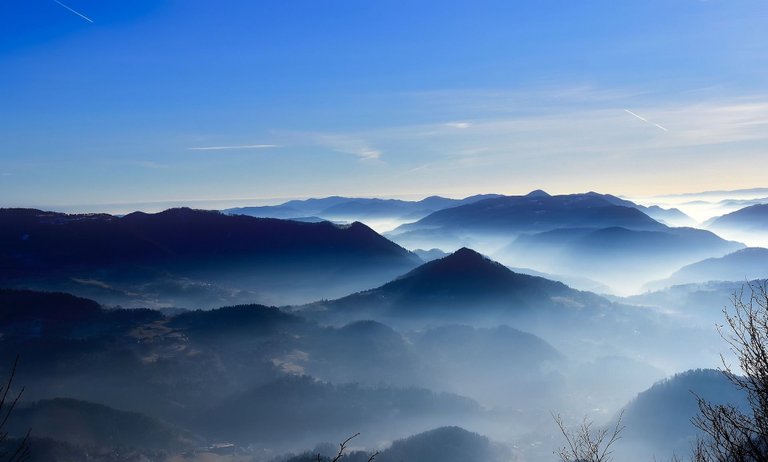 Image by David Mark from Pixabay
Image by David Mark from Pixabay
in sighing troughs and valleys -
dew bathes waking leaves.


The mountains have a magic and spirit all of their own. It comes as no surprise to me that so many people of a religious bent have had mystical experiences while at the top of mountains.
I visit the mountains for meditation. To climb a mountain is an exercise in contemplation in itself. I can always remember as a child being taken on hiking trips to the mountains of Snowdonia near-ish to my home city. Climbing those peaks plunged my busy child's mind into a slower mode; the heavy presence of the mountain seemed to engender a fascination of all the small aspects of nature around me. The pattern of the wind on the lake, the sound of the breeze through the long grass and the occasional warble of grouse in the distance.
"Now the mountains were getting that pink tinge, I mean the rocks, they were just solid rock covered with the atoms of dust accumulated there since beginningless time."
― Jack Kerouac, The Dharma Bums
Like all children all I wanted to do was run, play and gain the attention of the adults around me, but on these hiking trips it seemed like the solemn timelessness of the mountain stilled my manic child's energy. The whole experience is hard to explain, especially when drawing from memory. I like to think I was absorbing some of the immeasurable silence that resides at the heart of the mountains.
The haiku in this post personifies the mountain and the land around it. Seeding life to the trees through their leaves with its breath.
I think this Haiku captured what Japanese Haiku masters call Mono no aware (物の哀れ):
an empathy with nature and human life; the "feeling of things", nostalgia, regret for the passing of time, understanding of the changeability and of the transience without suffering.
Along with Yūgen (幽玄):
a sense of wonder and mystery; it represents the state of mind produced by the inexplicable fascination of things, the feeling of an 'other' universe, full of mysterious unity.
and Shiori (しおり):
a gentleness; the levity and the delicate charm that radiates from the verses, where things are evoked in the reader without aggressiveness or excessive explicitness.
I have decided to challenge myself for a month to post a daily Haiku on Hive. Each week will have a different theme based on a picture prompt.
This week's broad theme is Reflection on Nature.
To read more about the aesthetics of true haiku, and the difference between haiku and senryu, please check out my post: Haiku Vs Senryu - The Aesthetics of Form

I would like to give a big shout-out to @stickupcurator (and @stickupboys) for their amazing contribution to supporting music, art, imaginative writing, and all things creative on hive. If you haven't already, you should go check out their account for music, crypto podcasts and much much more 🙂👍
All images in this post are creative commons license, linked below pictures. If you have enjoyed this Haiku, please check out my homepage @raj808 for similar content. Thank you.




I think I understand it well now...
Thanks for your previous response on Haikyuu's.
Lemme try writing one...
The syllable count in your poem isn't right for true haiku, yours is:
6
7
6
By my count.
Good first try tho 👍
To make it right on the syllable count you could just edit it to read...
The warm mountains stand
solid and strong, tall and free
The big bro of hills.
This website is good for checking the syllable count on haiku
https://www.poetrysoup.com/haiku_syllable_counter/
🙂
Okay I'll check it out
Congratulations @raj808! You have completed the following achievement on the Hive blockchain And have been rewarded with New badge(s)
You can view your badges on your board and compare yourself to others in the Ranking
If you no longer want to receive notifications, reply to this comment with the word
STOP